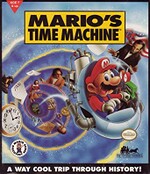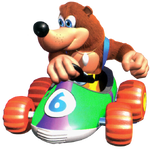User:DandelionSprout/Microsoft page testing
| Microsoft page testing | |
|---|---|
| Founded | April 4, 1975 |
| Current president | Satya Nadella |
Microsoft is an American software and hardware company based in the United States of America, whose software products have a long history between them and Nintendo's Super Mario franchise, in regards to Mario games released on MS-DOS, Windows 3.1 and Windows 95, the long-lasting effects of when Microsoft bought Rare Ltd. from Nintendo as part of entering the home console market with the Xbox, and the two companies competing in the home console market since 2001.
MS-DOS
Donkey Kong (game)
A licensed port of the first Donkey Kong arcade game was released on MS-DOS in late 1983. The port was marketed as being for IBM computers, as its command line operating systems IBM PC DOS v2.x and MS-DOS v2.x were both developed by Microsoft at the time.
The biggest change compared to the arcade version is that the top platform of 25 m is missing, resulting in Donkey Kong and Pauline standing in the upper right instead of the upper left.
1990's

Between March 31, 1991 (Super Mario Bros. Print World) and October 31, 1996 (Mario Teaches Typing 2) various Super Mario games that were licensed by Nintendo but developed and published by third-party companies were released on MS-DOS and during the later years on Windows 3.1 and Windows 95, and which had varying extents of edutainment aspects in them:
- Super Mario Bros. Print World (March 31, 1991)
- Mario Teaches Typing (March 8, 1992)
- Super Mario Bros. & Friends: When I Grow Up (March 24, 1992)
- Mario is Missing (1992)
- Mario's Time Machine (1993)
- Mario's Early Years! Fun with Letters (1993)
- Mario's Early Years! Fun with Numbers (September 1994)
- Mario's Early Years! Preschool Fun (November 1994)
- Mario's Game Gallery (February 23, 1995)
- Mario Teaches Typing 2 (October 31, 1996; Windows 95)
Two Super Mario games on Windows that debuted on MS-DOS later received remasters for graphical Windows interfaces: Mario Teaches Typing in 1994 when Windows 3.11 and Windows NT 3.5 were the newest Windows GUI versions, and Mario's Game Gallery for Windows 95 under the name Mario's FUNdamentals.
Nintendo discontinued the licensing of Mario properties for games on non-Nintendo systems in the aftermath of Super Mario 64, and no such officially licensed games have been made from scratch for Windows devices since then.
Bill Gates
Bill Gates, one of the founders of Microsoft, appears in the February 20, 1996 issue of Shitamachi Ninjō Gekijō digital comic that was exclusively distributed on Satellaview, represented by a plushie of the titular character of the Japanese manga Tensai Bakabon.
Having initially been mistaken by Toad for a beer company poster girl due to L/R spelling issues, Mario recognizes him as Bill Gates and ask him to give them money, to which Gates explain that Windows 95 (which Mario and Toad had quarreled over earlier in the chapter as they thought it was the name of a vehicle) is not a vehicle but is instead "something you wear on your head", making Mario and Toad think he is an idiot and the magazine issue ends at that point.
The magazine was officially licensed by Nintendo, but not by Microsoft.
Rare Ltd.
On September 24, 2002, Rare Ltd. which had until then been a second-party developer for Nintendo consoles, were sold to Microsoft and became a developer studio for the Xbox. This resulted in several Donkey Kong-related projects for Nintendo GameCube and Game Boy Advance that Rare had begun work on to be canceled entirely or were heavily changed to fit non-Nintendo properties before release.

Cancelled games
Nintendo GameCube
Game Boy Advance
Diddy Kong Racing DS
At the time the game was developed and eventually released in 2007, Microsoft had no gaming devices in the portable market and therefore allowed Rare Ltd. free choice to develop games for portable consoles, who eventually developed Diddy Kong Racing DS, a remake of the original Diddy Kong Racing on the Nintendo 64.
As Banjo and Conker were considered Microsoft properties at the time, they were replaced by Dixie Kong and Tiny Kong in the remake.
Donkey Kong Country series on Virtual Console
As the Donkey Kong Country original trilogy was developed by Rare Ltd., Nintendo did not have full license rights to the games. While the first Donkey Kong Country game was made available on Virtual Console within a few weeks of the Nintendo Wii console being released, and the second and third games being rolled out there in 2007, all three games were delisted on November 25, 2012 and were gradually re-listed again in 2014-15, this time on both Wii and Wii U, and all releases of the game have remained listed since then to the extent the consoles' online game stores have remained online.
The Donkey Kong Land series have never been affected by any delistings.
Donkey Kong 64
Donkey Kong 64 that had also been developed by Rare Ltd. and released in 1999, was not released on any version of Virtual Console until on the Wii U in April 2015.
The DK Rap had originally been recorded for Donkey Kong 64. Prior to the sale of Rare Ltd., a new version of the was recorded for the Kongo Jungle stage in Super Smash Bros. Melee, which became the standard version for later games where the DK Rap is used.
Banjo

Banjo's first game in any franchise was in Diddy Kong Racing on the Nintendo 64, seven months before the first game he starred in, and was later also featured as an available stamp in Mario Artist: Paint Studio on the Nintendo 64DD.
After the Microsoft purchase of Rare Ltd., Banjo became a Microsoft property which resulted in licensing and ownership conflicts between Nintendo and Microsoft over Banjo and the two games he starred in during the Nintendo 64 era, Banjo-Kazooie and Banjo-Tooie, for the following two decades, eventually reaching license agreements for those games in 2022.
Super Smash Bros. Ultimate
- Main article: Banjo § Super Smash Bros. Ultimate

Banjo and his companion Kazooie from the two games they starred in on Nintendo 64 were announced as a paid DLC duo for Super Smash Bros. Ultimate in a Nintendo Direct on June 11, 2019, and became available for purchase on September 4, 2019.
Rounds two and six of their Classic Mode tour are fought against opponents from the Super Mario franchise, namely Rosalina & Luma and Donkey Kong+Diddy Kong respectively.



